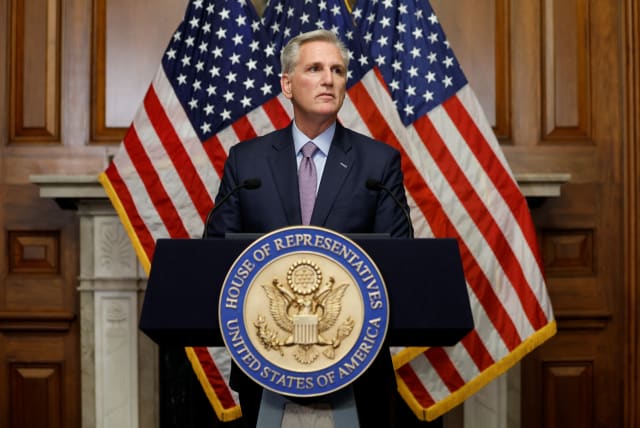Can McCarthy’s ouster harm Israel and help sink the Saudi deal? - analysis

Until Tuesday, all eyes had been focused on how political instability in Israel could prevent an agreement.
Washington’s political chaos is always bad for Israel.
The House of Representatives’ decision on Tuesday night to remove Kevin McCarthy as speaker, for the first time in the body’s history, comes however as negotiations are underway for a US-brokered normalization deal between Saudi Arabia and Israel.
Until Tuesday, all eyes were focused on how political instability in Israel could prevent an agreement from materializing.
Prime Minister Benjamin Netanyahu’s controversial judicial reform legislation is an issue, as is opposition within his coalition to the Saudi deal that could collapse his government.
Was it actually the hostile political climate in Washington that could sink the deal?
On Wednesday morning, bitter partisan tit-for-tat infighting in Washington highlighted by McCarthy’s ouster, with the help of eight angry Republicans, raised the sudden question as to whether it was really the hostile political climate in Washington that could lead to the deal’s downfall.
It had always been presumed that there was a small window of time, through March 2024, for the kind of bipartisan cooperation needed for its approval.
That kind of cooperation is particularly important because the deal is one of the most complex agreements Washington has attempted in the Middle East. It has security components that must receive bipartisan support in the Senate, as well as funding components that could need approval from the House, which can only operate at that level once a new speaker is chosen.
The passage of the agreement in the Senate and the House is based on a carefully calculated political balancing act. McCarthy’s ouster, however, makes it seem that Washington lacks the kind of bipartisan cooperation needed for a Saudi deal that is primarily a security pact between the US and Riyadh against Iran.
What did former Israeli Ambassador to the US Danny Ayalon say?
“Everyone is standing and looking with astonishment at what is happening in Congress,” former Israeli ambassador to the US Danny Ayalon said. They are amazed at “how eight [Republican] members of Congress can put the entire world on its head because of internal politics.”
The domestic and foreign policy issues that could arise are much larger than just Israel’s concerns, he said.
“If the Republicans do not get their act together and immediately vote and elect a new speaker then there is going to be a situation of unpredictability [in DC] which can run into the campaign season,” Ayalon said. He added that the only ones who benefit from this are Russia, Iran, North Korea, and China.
Former Israeli ambassador to the US Michael Oren said, “I am sure our common enemies are looking at what is happening in Washington and saying, ‘Good, here is an opportunity.’”
Among those are Iranian leaders who might now think “the US and Israel are not functional” and that this could be a good time to attack, Oren speculated.
“The Soviet calculation in backing the Yom Kippur war 50 years ago may well have been influenced by the Watergate scandal because then [President Richard] Nixon was incapacitated” as a result.
“We all understand that Putin’s decision to invade Ukraine was influenced by the American withdrawal from Afghanistan,” he noted.
What did former US Ambassador to Israel Daniel Kurtzer say?
Former US Ambassador to Israel Daniel Kurtzer said he did not think McCarthy’s removal would impact a pending Saudi deal. His ouster was reflective of “an extreme manifestation of extreme dysfunction” in Washington and within the Republican Party in particular, Kurtzer said.
“It has immediately nothing to do with foreign policy,” except for its potential impact on funding for Ukraine, he said. “It won’t stop the administration from continuing to push the Saudi deal,” Kurtzer explained, adding that there are issues in the Senate that were more likely to impact the deal’s feasibility.
Its opponents in the Senate are concerned in part by Saudi Arabia’s poor record on human rights, the war in Yemen and the killing of journalist Jamal Khashoggi in 2018, he stated.
Then there are people who are looking at the Palestinian element of the deal, he said.
There are those who “either do not want to give too much to Palestinians or believe that not enough will be given to the Palestinians” and they “are not going to change their minds because of McCarthy,” Kurtzer stated.
Given the deal’s benefits to Israel it would be difficult for Republicans to oppose the deal, even though it is a Democratic initiative, he explained.
“There are at least three metrics by which to measure the Saudi deal. The most important is the defense and nuclear issue, the second is the Palestinian component and the third is going to be the [Washington] politics of it,” he stated.
“On the political side, Republicans won’t want to give Democrats a good talking point but they also do not want to be in a position of scotching a deal in which Israel could gain normalization with a significant Arab country,” Kurtzer added.
“I do not see any way that because of politics they [Republicans] will vote against a deal,” he said.
Oren, however, said that he believed Washington was too polarized to back a Saudi agreement.
There are Democrats who oppose it and “my sources are telling me that the Republicans will never ratify this,” Oren said.
Washington is so “polarized that the Republicans will not give [US President Joe] Biden a win” even if the agreement is important for Israel.
“I do not know if ‘caring for Israel is enough’ when it comes to this deal,” Oren said.
Jerusalem Post Store
`; document.getElementById("linkPremium").innerHTML = cont; var divWithLink = document.getElementById("premium-link"); if (divWithLink !== null && divWithLink !== 'undefined') { divWithLink.style.border = "solid 1px #cb0f3e"; divWithLink.style.textAlign = "center"; divWithLink.style.marginBottom = "15px"; divWithLink.style.marginTop = "15px"; divWithLink.style.width = "100%"; divWithLink.style.backgroundColor = "#122952"; divWithLink.style.color = "#ffffff"; divWithLink.style.lineHeight = "1.5"; } } (function (v, i) { });


